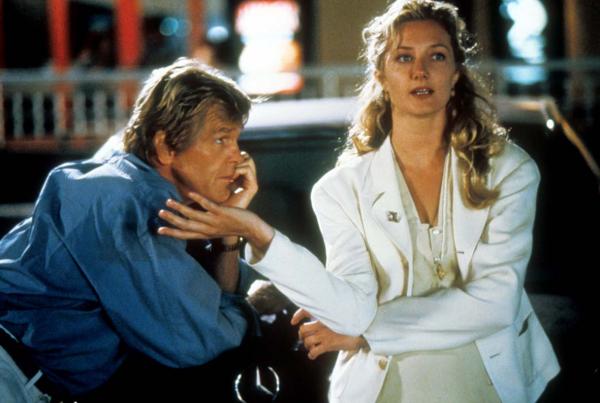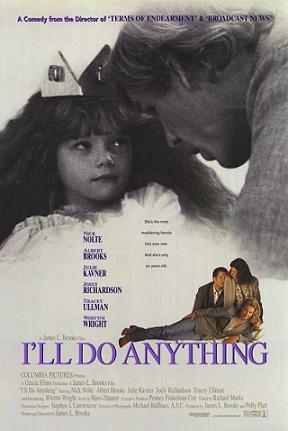From the January-February 2011 Film Comment. — J.R.
“In describing rarely screened movies like Lev Kuleshov’s The Great Consoler or Ritwik Ghatak’s Ajantrik,” wrote a Boston Globe reviewer of my latest collection, “Rosenbaum is like a restaurant critic describing the mouth-watering meal he had at a restaurant that just closed in another city.” Since both films are available on DVDs with English subtitles to anyone who knows how to Google, this is a dubious compliment at best. But it might apply to the following, from my 2000 book Movie Wars: “Having had the opportunity to see I’ll Do Anything as a musical, I can report that it was immeasurably better in that form — eccentric and adventurous, to be sure, but also dramatically and emotionally coherent.”
I hope that someday Brooks can find a way of releasing his original cut of this film on DVD, though I’m told that the cost of the song rights might make this prohibitive. (Nine of these original songs are by Prince, and at least two others are by Carole King and Sinéad O’Connor.) So what follows is an attempt to explain what I like about a movie you may never be able to see, which is still my favorite Brooks feature.
“I conceived the story as a musical,” Brooks said, after doing his hasty reshoots to paper over the missing musical numbers that were lost to test marketing, “because musicals have a heightened sense of reality. Through song you can get closer to the truth.” And even though not all of the experimental numbers “work” especially well (I could have done without the title tune, for instance), I would still argue that the best of these — all featuring Twyla Tharp’s twitchy choreography as well as songs — are irreplaceable because they come closer to the truth than the remainder of this film.
I lack much familiarity with Brooks’s sitcoms apart from two animated ones (The Simpsons and The Critic), but suspect that a deep-seated conflict underlying most of his features seems closely related to his TV background — an enslavement to ratings and all they imply coupled with a troubled conscience about the implications and consequences of his enslavement. This involves empathy for talented and principled neurotics rejected by this system (Albert Brooks’s newscaster in Broadcast News, Nick Nolte’s actor in I’ll Do Anything) and a love-hatred for other neurotics who are perhaps even more troubled yet who seem to thrive in the same industry (the respective producers played by Holly Hunter and Albert Brooks in the same two films). Jack Nicholson in As Good As It Gets and Téa Leoni in Spanglish embody non-showbiz versions of related maladies, and here again, regardless of whether Brooks loves them or hates them, he seems to know them on a first-person basis. Albert Brooks admitted to Gavin Smith (in the July/August 1999 Film Comment) that his monstrous test-marketing producer “must have” been based on Joel Silver, because Silver hadn’t spoken to him since, but James Brooks, his friend, has also confessed (in a Los Angeles Times story back in 1993) that the character was at least partly a bitter self-portrait.
It may have been the wrenching honesty of this insider’s take on the brutality of studio politics more than the conventions of the musical numbers that preview audiences rejected — or, rather, rejected immediately after they saw the movie, before they had time to adjust to its strangeness. (Who knows what they might have thought or felt a couple of hours later, which the voodoo science of test-marketing routinely ignores?) There may have been other factors that contributed to the turn-offs — such as the creepy performance of Whittni Wright as Nolte’s bratty, precocious little girl (part of whose icky solo number, alas, is the only song retained in the final version). But the best numbers were what got removed, and the raw, crippled feelings they embody are what one misses most.



